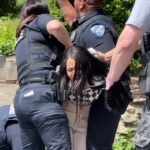At least 3,141 people were killed in Haiti between January 1 and June 30, 2025, according to a damning report released on July 11 by the United Nations Integrated Office in Haiti (BINUH) and the Office of the High Commissioner for Human Rights (OHCHR).
The report highlights that gang violence outside the capital, Port-au-Prince, Haiti, has reached a critical threshold, leaving more than 1,000 dead and forcing hundreds of thousands to flee their homes between October 2024 and June 2025.
Violence Spreading Beyond Port-au-Prince
While Port-au-Prince (Capital of Haiti) has long been plagued by insecurity, armed gangs are now extending their control into the Lower Artibonite region, the Central Plateau, and areas near the Dominican Republic border. In these zones, at least 1,018 people were killed, 213 injured, and 620 kidnapped, according to the UN report.
The October 2024 massacre in Pont Sondé, which left over 100 dead, marked a turning point, igniting a vicious cycle of retaliatory violence between gangs and self-defense militias.
In Mirebalais, a city of around 100,000 residents, the population has been almost entirely displaced due to ongoing attacks.
“Human rights violations outside Port-au-Prince are intensifying in areas where the state’s presence is virtually nonexistent. The international community must strengthen its support to Haitian authorities, who bear the primary responsibility for protecting their population,” said Ulrika Richardson, UN Resident Coordinator and acting head of BINUH.
The report underscores the glaring absence of the state in rural areas, leaving civilians defenseless. It documents summary executions committed by gangs, self-defense groups, and even security forces. Nationwide, a total of 4,864 homicides were recorded during the reporting period.
Despite the deployment of specialized police units and the backing of the Multinational Security Support Mission (MSS), authorities have struggled to regain territorial control.
Regional Spillover Risks and Calls to Action
The UN warns of an escalating regional threat, pointing to increased trafficking of arms and human beings into neighboring countries. The report stresses the urgent need to tighten the arms embargo and support Haiti’s judicial institutions.
“The Haitian people are trapped between gang terror, militia abuses, and violations committed by security forces. The international community must act now,” declared the UN High Commissioner for Human Rights.
The report warns that the territorial expansion of gangs now poses a direct threat to national and Caribbean subregional stability. It recommends the following:
Equip and train the Haitian National Police to combat gangs while upholding human rights;
Establish specialized courts to prosecute mass crimes and corruption;
Maintain BINUH at full operational capacity to support governance efforts;
Expand the MSS mission;
Enforce the UN arms embargo more rigorously.
As Haiti sinks deeper into unprecedented chaos, the UN report serves as a stark warning: without massive international mobilization and fundamental state reforms, the country will be unable to recover.







